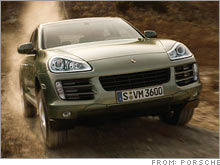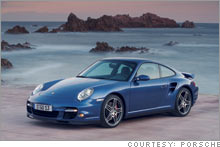NEW YORK (CNNMoney.com) -- With governments in the United States and Europe considering stricter fuel economy regulations, car companies all over are wondering how to meet the proposed demands.
But Porsche is worried that its status as a preeminent sports car maker could be regulated out of existence.
 |
| 2008 Porsche Cayenne |
 |
| 2007 Porsche 911 Turbo |
"We are an extreme niche player and we only offer higher performance cars," Peter Schwarzenbauer, chief executive of Porsche North America said in an interview with CNNMoney.com.
People who buy Porsches are paying for performance. And they pay a lot for what Schwarzenbauer calls "the Porsche experience," which is a good bit more than just a quick zero-to-sixty time.
Porsche has recently expanded its line-up from just sports cars to SUVs. In the next couple of years, a four-door sedan is expected. But despite its new offerings, the Porsche name is still, above all else, associated with the ultimate in driving, said Schwarzenbauer.
Current fuel economy rules now being considered don't make exceptions for high-performance cars or for companies that sell nothing but those vehicles.
Tighter Corporate Average Fuel Economy (CAFE) rules in the U.S. would be a hurdle for an auto maker like General Motors, but a company of GM's size and breadth has options.
GM could try to improve the fuel economy of all its cars.It's boosted the fuel economy of its large SUVs, but it could also work to sell more small, inherently fuel-efficient cars, like the Chevrolet Aveo, to offset sales of vehicles like the Chevrolet Corvette and GMC Yukon and boost its average.
Porsche, on the other hand, has no economy cars in its fleet to compensate. Nor will it, because cars like that just aren't what Porsche is about and never will be, said Schwarzenbauer.
The company has improved the fuel efficiency of its products, he insists. "Every new engine generation we've brought out in the last 10 years has had less fuel consumption," he said.
If the "Porsche experience" Schwarzenbauer speaks of were just about speed, the answer to bigger improvements would be simple: hybrids.
Porsche expects to introduce a hybrid version of its Cayenne SUV in a couple of years and, later, a hybrid version of the yet-to-be-released Panamera sedan.
The Cayenne Hybrid is expected to get 25 percent better fuel economy than the non-hybrid. It's also expected to be able to cruise under electric power alone at speeds of up to 70 miles per hour.
But that's not likely to be the answer for a sports car like the Porsche 911 or Cayman, said Schwarzenbauer.
"From what I'm seeing right now, not in the foreseeable future," he said. "The impact on a sports car is that you add weight to it."
An SUV, like the Cayenne, is already a heavy vehicle where weight balance isn't critical. But for sports car buyers, especially those who can afford a Porsche, balance and weight are key criteria because they affect handling. A sports car couldn't easily accommodate the bulk of a hybrid power train without being turned into a car that is merely fast, said Schwarzenbauer.
Not surprisingly, Paul Williamsen, lead technical instructor for Toyota's Lexus division, disagrees with Schwarzenbauer's outlook on hybrid sports cars.
Toyota recently won a 24-hour race in Japan with a hybrid car called the Supra HV-R. And Toyota's Lexus luxury division includes performance-oriented hybrid sedans. And at January's Detroit Auto Show, Toyota showed off a version of a possible production hybrid sports car, the FT-SH.
New hybrid electric motor systems, including one being introduced this fall by General Motors, allow hybrid drivetrains to be packaged in the space currently used by the car's transmission alone.
The one remaining challenge, Williamsen said, is improving batteries to take up as little space as a tank of gasoline. "With each generational change we've more than doubled energy density of our battery packs," he said.
There's enough space that's "not mission critical," he theorized, to fit more powerful batteries without upsetting the car's balance - even in a rear-engined 911 sports car. Space used by the car's front luggage compartment and its largely nominal rear seats could be taken over for batteries.
To further reduce weight, Williamsen said, Porsche could take advantage of the extra power from the hybrid system to use a smaller gasoline engine in the car. "The goal would be to get 3.6-liter performance out of a 2.7-liter engine."
Diesel engines, which use much less fuel than gasoline counterparts, could offer another solution. Half of all cars sold in Europe, including half of all BMWs sold there, run on them. In the United States, Mercedes-Benz sells a diesel version of its E-class that is by no means lacking in performance.
But, again, points out Porsche spokesman Tony Fouladpour, those are sedans, not sports cars. Diesel engines are heavier than gasoline engines. That weight difference is less critical in a sedan, but it could ruin a small sports car.
Diesel engines also operate at lower running speeds, typically "red-lining" at about 4,500 RPM where a gasoline engine can rev up to 7,500 or 8,000 RPM. That high-revving sound is a big part of the experience of driving a Porsche, Fouladpour said.
Schwarzenbauer also pointed out that removing all of the company's cars from the road immediately would cut down on greenhouse gas emissions from automobiles by about 0.001 percent.
Porsche isn't against greener cars, he insists. "We just want to have legislation where we compared to our segment," he said, "to our real competitors."
Otherwise, the "Porsche experience" might have to change a great deal. 